Intel P965: Mid-Range Performance Sector Roundup
by Gary Key on October 20, 2006 9:00 PM EST- Posted in
- Motherboards
Audio Performance
We limited audio testing to the Rightmark 3D Sound version 2.3 CPU utilization test and tested with sound enabled to show the performance effects on several games. The Rightmark 3D Sound benchmark measures the overhead or CPU utilization required by a codec or hardware audio chip.
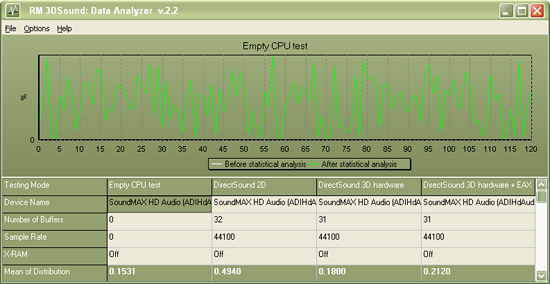
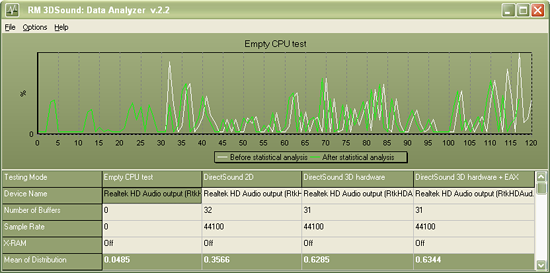
We are no longer showing the individual CPU utilization rates as the use of a dual core processor means the driver load is balanced between each processor with either audio solution. The 2.3 version of Rightmark properly supports dual core processors now but considering the results presented for review they are almost meaningless for these users at this time. We have found the CPU utilization rate improvements with the dual-core setup in this test do not have any bearing on actual game benchmarks as the reduction in frame rate percentages are the same on our single core systems.
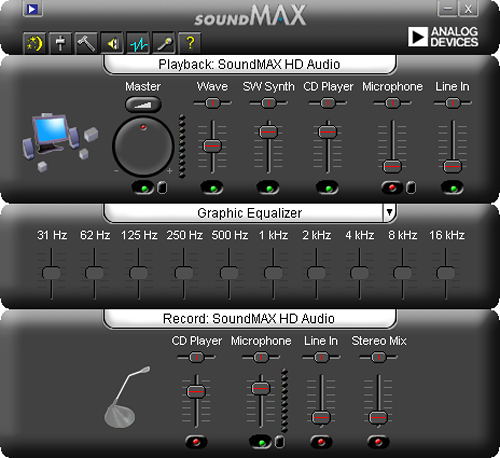
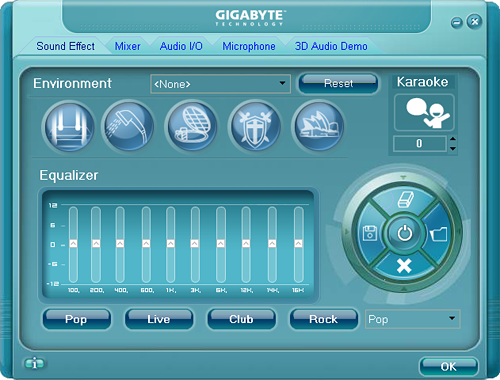
ASUS has recently switched over to the Analog Devices SoundMAX series of HD Audio Codecs with the balance of manufacturers still using the Realtek ALC-88x HD Audio Codecs. Both audio chipset manufacturers offer equal settings in their applications although we prefer the look of the ADI control panel and the fact that most of the settings are available on the front screen. We are using the 4530 driver release for the ADI codecs and the 1.47 driver release for the Realtek codecs.
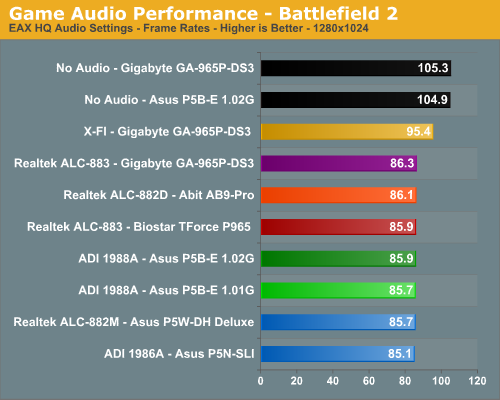
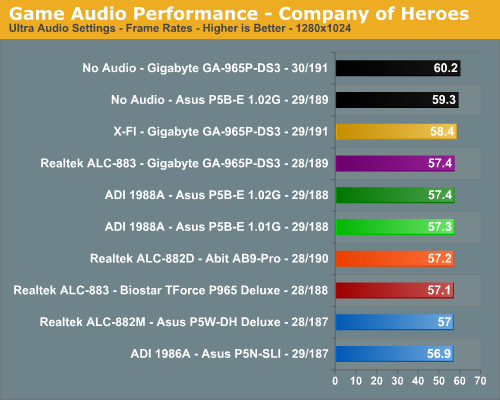
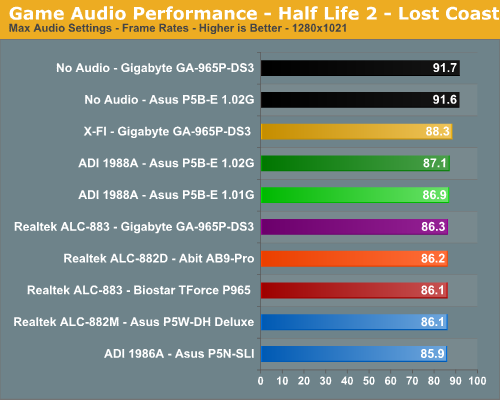
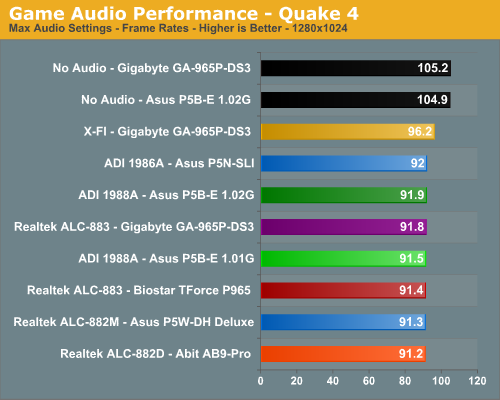
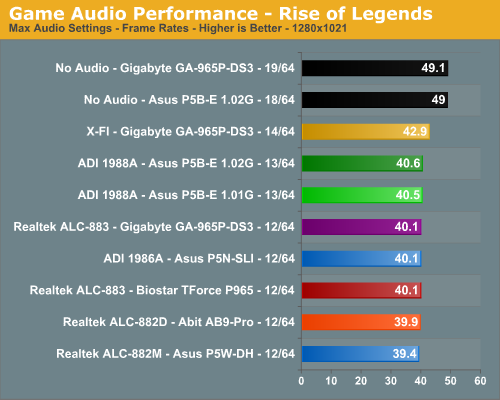
The audio performance numbers remain consistent between the Analog Devices and Realtek Codecs but both finish consistently behind the SoundBlaster X-FI in the benchmarks. This is to be expected as the ADI and Realtek Codecs are host processing units dependent upon the CPU and drivers for generating their audio streams. The SoundBlaster X-FI on the other hand has dedicated hardware that generates its audio streams and off loads this burden from the CPU. We are finding the CPU utilization to be constantly decreasing for the on-board solutions as CPU processing power increases and driver optimizations improve but they still take a toll in certain games. This is reflected in our numbers as Battlefield 2 has an average loss of 22% (was 28%), Quake 4 at 14% (was 21%), Half Life 2- Lost Coast at 5%, Company of Heroes at 5%, and Rise of Legends at 22%.
Rise of Legends is a very CPU intensive game with numerous sound effects and as such the CPU hit for generating audio is significant although we did not notice any stuttering during game play. Battlefield 2 utilizes EAX 2 for our ADI and Realtek HD Codecs which creates another significant on the CPU to process the audio streams, especially with the sound effects set to high. Quake 4 is the exception to the rule as it is generally GPU limited leaving additional CPU cycles for audio processing. In this case the ADI and Realtek solutions still create a large hit on frame rates in this game where frame rates are everything.
Analog Devices has made news lately claiming other host-based audio solutions (aimed at Realtek) do not properly generate EAX compatible audio in their drivers. During our testing we found this to be true to some degree. Since our previous Realtek testing always compared EAX 2 to the X-FI series we basically assumed some of the muddy audio (complete lack of obstructions and occlusions) we encountered in Battlefield 2 as an example were just issues with the Codec or a poor implementation of EAX 2 in the drivers. After comparing the ADI 1988A to the Realtek ALC-882D in Battlefield 2 we completely agree the issues we heard before are strictly driver related. In fact, the ADI 1988A generated EAX 2 sound effects that were very close or equal to our Audigy 2 and within hearing distance of our X-FI. The audio quality difference in EAX capable games between the ADI and Realtek HD Audio Codecs were almost startling. We firmly believe this is due to obstructions and occlusions not being implemented correctly in the Realtek drivers.
The audio differences in other games such as Company of Heroes were minimal although you could still tell the difference. This was especially true in the CoH benchmark where the two Ammerican soldiers are treading through the water to meet their group. You could hear the water gently move as they walked while with the Realtek solution the water sounded like a wet mop. This pattern held true for all of our games we tested throughout the benchmark process including twenty five games that we tested off-line. While ADI has had some driver issues in the past we found both the 4530 and 4570 drivers to be very stable and almost problem free. We have some reports of ADI driver issues from our readers that we are still investigating at this time with the ASUS P5B-Deluxe board. We believe ASUS made the right decision to switch to ADI for their more enthusiast level boards at this time.
Obviously, if you are a serious gamer, then a dedicated sound card is still useful to ensure consistent frame rate averages across a wide variety of games, and in the case of the Sound Blaster X-FI, you also get improved audio quality and EAX3/4/5 support. If you'd like more details on the Realtek or ADI solutions, you can refer to the Realtek HD Audio Codec Specifications or SoundMAX HD Audio Codec Specifications .
We limited audio testing to the Rightmark 3D Sound version 2.3 CPU utilization test and tested with sound enabled to show the performance effects on several games. The Rightmark 3D Sound benchmark measures the overhead or CPU utilization required by a codec or hardware audio chip.


We are no longer showing the individual CPU utilization rates as the use of a dual core processor means the driver load is balanced between each processor with either audio solution. The 2.3 version of Rightmark properly supports dual core processors now but considering the results presented for review they are almost meaningless for these users at this time. We have found the CPU utilization rate improvements with the dual-core setup in this test do not have any bearing on actual game benchmarks as the reduction in frame rate percentages are the same on our single core systems.


ASUS has recently switched over to the Analog Devices SoundMAX series of HD Audio Codecs with the balance of manufacturers still using the Realtek ALC-88x HD Audio Codecs. Both audio chipset manufacturers offer equal settings in their applications although we prefer the look of the ADI control panel and the fact that most of the settings are available on the front screen. We are using the 4530 driver release for the ADI codecs and the 1.47 driver release for the Realtek codecs.





The audio performance numbers remain consistent between the Analog Devices and Realtek Codecs but both finish consistently behind the SoundBlaster X-FI in the benchmarks. This is to be expected as the ADI and Realtek Codecs are host processing units dependent upon the CPU and drivers for generating their audio streams. The SoundBlaster X-FI on the other hand has dedicated hardware that generates its audio streams and off loads this burden from the CPU. We are finding the CPU utilization to be constantly decreasing for the on-board solutions as CPU processing power increases and driver optimizations improve but they still take a toll in certain games. This is reflected in our numbers as Battlefield 2 has an average loss of 22% (was 28%), Quake 4 at 14% (was 21%), Half Life 2- Lost Coast at 5%, Company of Heroes at 5%, and Rise of Legends at 22%.
Rise of Legends is a very CPU intensive game with numerous sound effects and as such the CPU hit for generating audio is significant although we did not notice any stuttering during game play. Battlefield 2 utilizes EAX 2 for our ADI and Realtek HD Codecs which creates another significant on the CPU to process the audio streams, especially with the sound effects set to high. Quake 4 is the exception to the rule as it is generally GPU limited leaving additional CPU cycles for audio processing. In this case the ADI and Realtek solutions still create a large hit on frame rates in this game where frame rates are everything.
Analog Devices has made news lately claiming other host-based audio solutions (aimed at Realtek) do not properly generate EAX compatible audio in their drivers. During our testing we found this to be true to some degree. Since our previous Realtek testing always compared EAX 2 to the X-FI series we basically assumed some of the muddy audio (complete lack of obstructions and occlusions) we encountered in Battlefield 2 as an example were just issues with the Codec or a poor implementation of EAX 2 in the drivers. After comparing the ADI 1988A to the Realtek ALC-882D in Battlefield 2 we completely agree the issues we heard before are strictly driver related. In fact, the ADI 1988A generated EAX 2 sound effects that were very close or equal to our Audigy 2 and within hearing distance of our X-FI. The audio quality difference in EAX capable games between the ADI and Realtek HD Audio Codecs were almost startling. We firmly believe this is due to obstructions and occlusions not being implemented correctly in the Realtek drivers.
The audio differences in other games such as Company of Heroes were minimal although you could still tell the difference. This was especially true in the CoH benchmark where the two Ammerican soldiers are treading through the water to meet their group. You could hear the water gently move as they walked while with the Realtek solution the water sounded like a wet mop. This pattern held true for all of our games we tested throughout the benchmark process including twenty five games that we tested off-line. While ADI has had some driver issues in the past we found both the 4530 and 4570 drivers to be very stable and almost problem free. We have some reports of ADI driver issues from our readers that we are still investigating at this time with the ASUS P5B-Deluxe board. We believe ASUS made the right decision to switch to ADI for their more enthusiast level boards at this time.
Obviously, if you are a serious gamer, then a dedicated sound card is still useful to ensure consistent frame rate averages across a wide variety of games, and in the case of the Sound Blaster X-FI, you also get improved audio quality and EAX3/4/5 support. If you'd like more details on the Realtek or ADI solutions, you can refer to the Realtek HD Audio Codec Specifications or SoundMAX HD Audio Codec Specifications .










62 Comments
View All Comments
JarredWalton - Saturday, October 21, 2006 - link
Oh, trust me, Gary tested with a LOT of RAM types and manufacturers. However, for the *benchmarks* he settled on one specific set of DIMMs. I think he's trying to put together some information on how the various boards worked with other RAM (see above comment from Gary). Cheers!stmok - Saturday, October 21, 2006 - link
LOL...I think its more like: "What the hell were the Abit engineers thinking?!"Based on your experiences, do you know if the Analog Devices AD1988A HD Audio Codec works in Linux? I wouldn't mind going for the ASUS P5B-E at the end of the year.
And finally, is the rev 1.02G mobo available now? Or in a few months time?
Gary Key - Saturday, October 21, 2006 - link
The 1.09 ADI AD1988A drivers worked fine in SUSE 10.1. Realtek has better support at this time but ADI seems to be catching up. Believe it or not, but we booted every board with SUSE 10.1 just to make sure they went to the desktop. We might even do a once in a while look at Linux down the road.
xsilver - Saturday, October 21, 2006 - link
what is the range of overclocking possible with pc6400 ram?without dividers? with dividers?
Gary Key - Saturday, October 21, 2006 - link
Good question, depends on the PC2-6400 RAM. We are working on something right now to answer your question with a few different modules.xsilver - Sunday, October 22, 2006 - link
probably something standard like corsair VS or something priced very similar if there is better performance elsewherexsilver - Sunday, October 22, 2006 - link
also I would assume that 1gig vs. 2gig makes no difference but if it does, it would be good to know.Madellga - Saturday, October 21, 2006 - link
Excellent review Gary. I also look forward for the round 2 and also for a 975/ATI/Nvidia reviews.Please try to mention the Vmch used for the overclocking results, as this says a lot about the motherboads also.
Gary Key - Saturday, October 21, 2006 - link
I am setting up a overclocking settings table and will try to show some additional results with different memory types that we used in testing. I have no idea when this will be finished. ;-)Ryan Norton - Saturday, October 21, 2006 - link
This article is terrific-- now I just need to read the high-end part and I can finally put together a Core 2 Duo system.Will the DS4 be included in the high-end guide? I don't want a DQ-6 because the copper backplate under the processor socket would prevent installation of a Scythe Ninja heatsink.
Are the AHCI issues going to stay the way they are, with needing to load the drivers from a floppy disk during Windows install, or are there any P965 boards that don't require "an engineering degree and a day off" as you guys said?